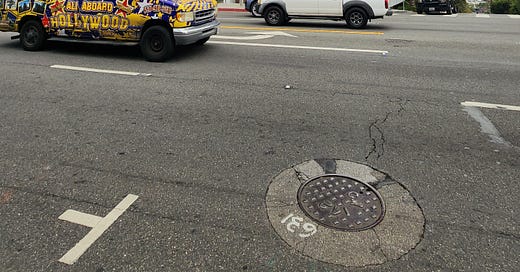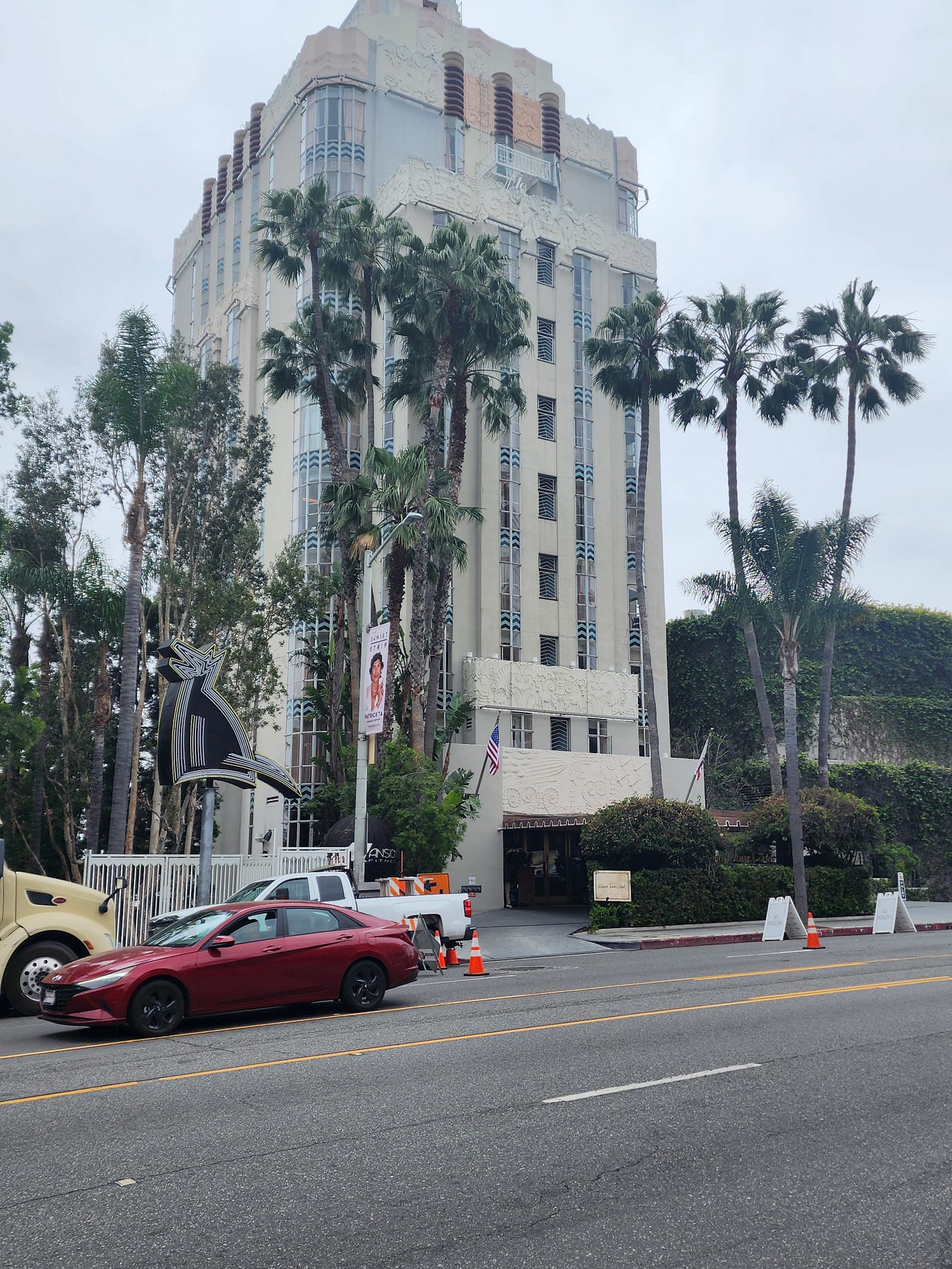I found myself in Los Angeles just for the day with a lot of time on my hands between meetings. So being a New Yorker and a walker, I took a journey across Sunset Boulevard, looking for musical sites that are either gone or forgotten, and relate back to the ‘80s and ‘90s when I was a full-time music journalist and Sunset was the hub for so much culture and nightlife. I photographed quite a few more locations that I’m sharing in this post, but they’ll be more to come. Here are five locations — notorious, beloved, and obscure.
The Pendry Hotel, 8430 Sunset Boulevard, was once the location of the House of Blues, which from its opening in 1994 through its demolition in 2015, was one of the most important venues in Los Angeles. It opened with much fanfare with the support of Blues Brother Dan Aykroryd, but it became a central location for lots of black musicians and fans of R&B and hip hop. It was across the street from the Mondrian to the west and the Hyatt (aka Riot House) and the Comedy Store on the opposite side of Sunset. On a busy night that intersection was a hot spot for music, laughter, and hotel room get downs. I used to stay religiously at the Mondrian (I even lived there for most of 1992, but that’s another story), so the House of Blues was a serious hang out for me. If you saw the ‘Dear Mama’ doc series, then you saw that Tupac’s most famous live performance was on stage there.
Currently the Sunset Tower Hotel, this art deco landmark has had many titles over the decades. It was the St. James Club in November 1992 when Rick and his girlfriend Tany Anne Hijazi, beat a woman repeatedly on a long drug filled night in an 11th floor suite. It was that attack that send Rick to jail, effectively ended the career of an innovative musician, and, years later, inspired a series of Dave Chappelle skits on his popular cable series. The St. James was a bit ratty, but Sunset Tower is classy and a great place to have a martini and act important.
This structure at the corner of Sunset and Roxbury has been vacant for many years but, in the ‘80s and early ‘90s, the ground floor was a bistro and that top floor the location of a semi-private club. This spot, Carlos ‘N Charlies, was a place young black glamour. It’s where on any given night Eddie Murphy in his box office glory, Prince coming from or going to a recording session at nearby Sunset Sound, and heavyweight champ Mike Tyson, where among the celebrities who could be found holding court with their posses or talking together about music, money, and starlets. Shalamar, the Wayans Brothers, Chris Rock, Soul Train dancers, LA Lakers and so many more came through. Across Sunset was Roxbury’s, an upscale restaurant and disco, which opened in 1989 and was run by respected restaurateur Brad Johnson. I have great memories of walking back and forth across Sunset to party at both spots in the early ‘90s when opportunities in Hollywood opened up (briefly) for my generation of wanna be filmmakers.
Today, back in 1984, Prince released “When Doves Cry,” the single that set the stage for his blockbuster Purple Rain album. Much of that landmark was recorded at 6650 Sunset, which was Prince’s favorite non-Minneapolis studio. Today the multi-room complex is still active but, as you can see a community of the homeless have set up camp in front of and around the side of the building. Makes you wonder what music this scene would have inspired in Prince.
Roscoe’s House of Chicken and Waffles at 1514 Gower is not a studio or record company office. It sells plates of chicken & waffles, and other soul food staples. But because it was two blocks from the LA office of Motown Records and one block from Sunset/Gower television studios, as well as various entertainment business related offices, it was from the ‘70s into the ‘90s, a go to stop for quick meals and loud conversation. When I was Billboard’s black music editor in the ‘80s I would stop at Roscoe’s whenever I was in town, not so much for the food, but the gossip and talk. I could post up at Roscoe’s in the afternoon and leave with a full notebook. Of my many memorable conversations at Roscoe’s the one that really sticks out was an encounter with Maurice Starr, the Boston producer who found, first New Edition, and then New Kids on the Block. Dressed in an nautical admirals cap and jacket, he regaled me with his “genius” and said of the all white New Kids, “I’m gonna work those kids until they drop. I’m gonna make all the money that white men made off of Chuck Berry and Muddy Waters.” That’s a conversation you don’t forget.
I’ll be back soon with a few more Sunset music memories.








